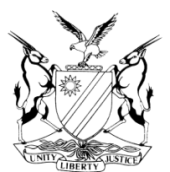REPUBLIC OF NAMIBIA

IN THE HIGH COURT OF NAMIBIA, MAIN DIVISION, WINDHOEK
REVIEW JUDGMENT
Case Title: The State v Diederick Baisako | Case No: CR 72/2023 | |
High Court MD Review No: 791/2023 | Division of Court: High court Main Division | |
Heard before: D Usiku J et Christiaan AJ | Delivered on: 7 July 2023 | |
Neutral citation: S v Baisako (CR 72/2023) [2023] NAHCMD 390 (7 July 2023) | ||
The order:
| ||
REASONS FOR ORDER | ||
CHRISTIAAN, AJ (D Usiku J concurring) [1] This matter was submitted to this court for review in terms of s 302(1) of the Criminal Procedure Act 51 of 1977 (the CPA). [2] The accused appeared in the magistrate’s court for the district of Luderitz, charged with theft and malicious damage to property. The accused pleaded guilty to both counts. The magistrate disposed of the matters in terms of s 112(1)(a), on both counts, on request of the public prosecutor. The accused was convicted and sentenced as follows: ‘Count 1: accused is fined N$1000-00 or 6 months imprisonment Count 2: Accused is fined N$1000-00 or 6 months imprisonment.’ [3] A query was directed to the magistrate whether the discretion to apply s 112(1)(a) of the CPA was exercised judiciously in respect of convictions on both counts, considering the principles laid down in the matters of S v Onesmus, S v Amukoto, S v Shipanga1. [4] The magistrate maintained in his response that in forming his opinion whether to proceed in terms of s 112(1)(a) or 112(1)(b), the presiding officer is largely guided by the nature and seriousness of the offence. He further maintained that the court may also take into account all other relevant and available information and the prescribed minimum sentences. The learned magistrate closed his response by adding that the application of section 112(1)(a) is not confined to petty statutory offences but should be used in respect of common-law offences where circumstances obviously warrant a sentence falling within the ambit of s 112(1)(a). In his view the offences the accused stand convicted of are common law offences and their monetary value is less than N$6000-00 as per s 7 of the Criminal Procedure Amendment Act 13 of 2010. [5] It is clear from the legal principles laid down in our courts on the application of s 112(1)(a) of the CPA, that it should only be applied where the crimes are “trivial”, “minor” or not “serious”.2 Presiding judicial officers should not lose sight of the objective of s 112(1)(a) which is to dispose of trivial offences and only if the offence does not merit punishment of imprisonment of any other form of detention. The provision confers a discretionary power to the presiding judicial officer that must be exercised judiciously.3 [6] Although a public prosecutor is dominus litus in the prosecution of the case, once the case is before court and the accused has pleaded, the invoking of s 112(1)(a) of the CPA after a plea of guilty, falls within the discretion of the court. The prosecutor may be invited to address the court as regards to the charge(s) but the court must exercise its discretion judiciously on the way forward. The court is guided by the nature and seriousness of the offence to form an opinion if the offence does not merit a fine in excess of N$6000 or punishment of imprisonment or any other form of detention without the option of a fine.4 [7] Furthermore, when the crimes are not trivial, magistrates should question accused person in terms of section 112(1) (b) of the CPA. It is trite that questioning in terms of s 112(1) (b) has a twofold purpose, namely to establish the factual basis of the plea of guilty and to establish the legal basis of such plea. The court must conclude whether the legal requirements for the commission of the offence have been met from the accused’s admissions.5 [8] In this case, considering the nature of the offences alleged, wherein the accused was found guilty of theft and malicious damage to property, these cannot be regarded as minor offences. Furthermore, the presiding magistrate in his reasons for conviction states that on the count of theft, the court’s view is that the accused had the intention to permanently deprive the lawful owner the use and enjoyment of her property and that the copper pipes valued at N$600-00 were not recovered. It is mind boggling, how the court came to the aforementioned conclusion, if the provisions of s 112(1)(b) were not applied. It is therefore my considered position, that the magistrate incorrectly applied the provisions of s 112(1)(a) upon the request of the prosecutor, thus did not exercise his discretion judiciously. The convictions and sentences cannot therefore be allowed to stand in respect of both counts. [9] In the result, it is ordered:
| ||
P CHRISTIAAN ACTING JUDGE | D USIKU JUDGE | |
1 S v Onesmus, S v Amukoto, S v Shipange 2011 (2) NR 461.
2 S v Onesmus, S v Amukoto, S v Shipange 2011 (2) NR 461.
3 S v Onesmus, S v Amukoto, S v Shipange 2011 (2) NR 461.
4 See: Commentary on the Criminal Procedure Act, Du Toit et al, Original Service 1987 at 17-2; Conviction solely on a plea of guilty.
5 S v Kalongo (CR 100/2021) [2021] NAHCMD 510 (01 November 2021).